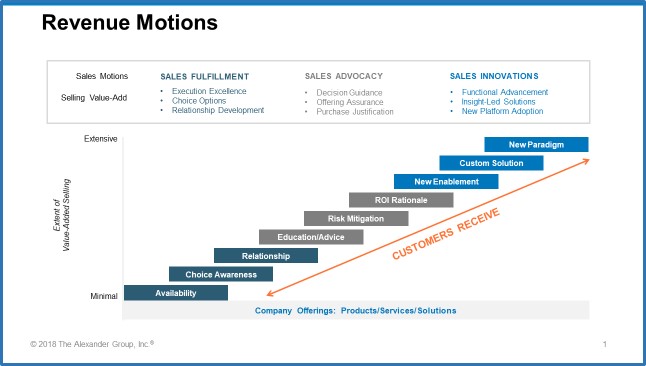Rethinking Revenue Growth: New Paradigms on Expert Selling

Revenue teams have deployed expert sales motions with customers for years. Specialists abound with matrixed geographic, technical, pre-sales and product organizations all vying for internal resources and customer mindshare. This leads to complicated processes, market confusion and an eroding value of the primary sales function over time. The noise will only increase as new types of specialists focused on next generation products, line of business selling and customer outcomes join the fray. How, then, should you think about making trade-offs between the focus that specialists bring and the complexity they create?
Challenge #1: The specialist mindset
Commercial leaders too often deploy (or inherit) specialist teams that once had a specific charter. They sold a new product. They came with an acquisition. They provided business development focus. All of these functions play critical roles in the health and success of a go-to-customer model. Challenge the ongoing nature of these functions. Do you still need focus on a “new” product you launched two years ago? Have you incorporated the value propositions of the acquired product into your core sales DNA? Do your digital tools provide business development focus for the core sales team? The answers to these questions will vary, but many organizations fail to even ask them. In a purely efficient environment (which, admittedly, most of us don’t operate in), most specialists would have a specific charter for a specified duration. Challenging the mindset on specialist sales requires asking ourselves, “Has this sales motion outlived its peak productivity?” Some specialist teams should, by design, “work themselves out of a job” over time.
This does not necessarily mean that teams or individuals need to change completely. Often, specialists have valuable sales skills that you can leverage to provide additional “sales pressure” to other parts of your go-to-customer model. It might require some “retooling” of the sales capacity, but it may also revitalize teams with new mission and purpose.
Challenge #2: Expertise of specialist roles
Not all specialists bring value in the same way. Some own portions of the sales process. Others have specific knowledge deemed “too detailed” for a core salesperson to internalize. Pre-sales roles in particular often bring technical, scientific or vertical knowledge critical to building credibility with buyers. Commercial organizations downplay the criticality of this expertise at their own risk. That said, this expertise generates results only when applied at the right moment with the appropriate buyers. Not every call made by a core salesperson needs to include a second attendee. If your team’s sales calls always seem to have “four legs” or more, you likely need to evaluate your specialist structure.
Creating value from “expert” specialist teams requires aligning them to specific sales motions. Some sales situations truly do require constant attention from a specialist type role. You should constantly challenge your teams on whether they truly need specialist support for a particular sales situation. If they always answer “yes,” the specialist might be the true persuasion seller.

The more advocacy- and innovation-oriented motions may require specialists to help deliver outcomes-based messages. These areas should be specialist rich in their approach. Fulfillment- and relationship-oriented sales motions should have less need for specialist intervention. Understanding the sales motion support will help to identify whether the specialist can or should potentially become obsolete as mentioned above or should be a permanent function in the revenue team.
Challenge #3: The proliferation of specialist roles
Specialist roles continue to multiply and expand. Many of you have likely recognized the need to begin migrating at least some of your sales approaches away from feature and benefit selling to business outcomes messaging. This has created a need for new types of specialization to tell those outcomes-based stories to potential line-of-business buyers. Vertical experts have gained in popularity as they can often describe experience-based outcomes. Outcomes also require adoption of solutions, which has led to the rise of the customer success function. This specialist generally has a process ownership role for activities following the initial sale. Many organizations have gradually added this function over time to support the specific outcomes-oriented portions of their sales motions. Most do not effectively “stop” one specialist motion in order to fund and pursue another, however. Do you still need a product-oriented specialist in a world where you sell outcomes to a vertical buyer? Perhaps, but many teams fail to ask the question and so have overlays upon overlays in their sales processes.
Challenge #4: Scaling specialist roles
Scale (or lack thereof) creates a final complexity to specialist deployment. How should you deploy specialists in markets without the single-country gravity to support a freestanding specialist team? The short answer lies in the type of specialized message the team delivers. High-end expertise unavailable through other channels will often resonate working in a second language across international borders. Features and benefits selling will have less impact. In short, you can scale truly expert teams with differentiated messages across borders in many markets. Reach and frequency style teams acting as “content reinforcers” rather than value-added sellers need to stay focused in a local language or geography.
Targeted specialist teams create focus, raise the level of client (or prospect) conversations and generally raise the perception of their sales team members through their interactions. All of these statements support the need to deploy specialist sales teams inside of commercial organizations. Unfortunately, you cannot rely on these observations remaining universally true over time. Customers may soon notice that specialists no longer add value, or that every meeting includes multiple team members. Messages and roles become confused and the expensive overlay model begins to lose traction in the marketplace. Avoiding these pitfalls requires that you ask difficult questions about the value your specialists add and how to ensure they continue to be viewed as experts by both your customers and your other sales team members.
Whatever geography your company operates in, Alexander Group can help you sort out the trade-offs and complexities of employing specialists. Contact an expert today.